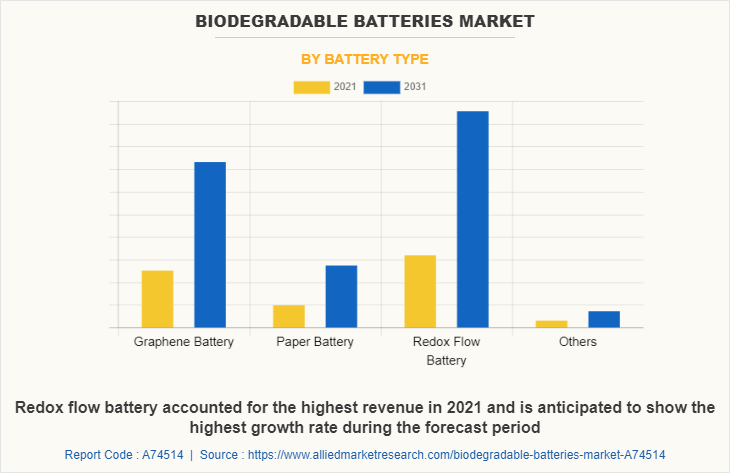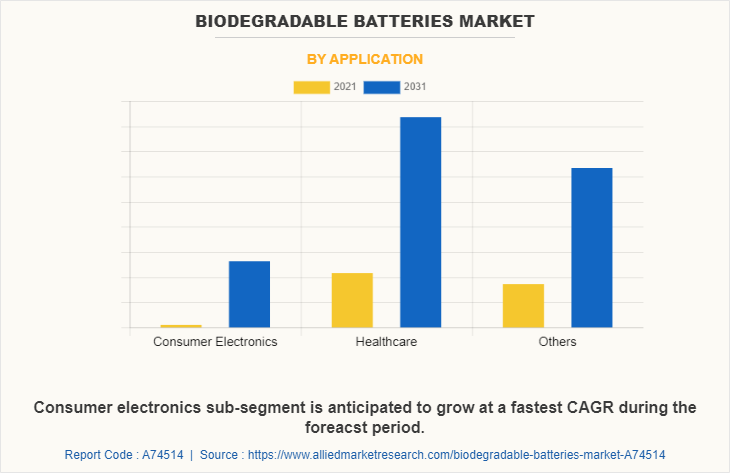Biodegradable Batteries Market Research, 2031
The global biodegradable batteries market was valued at $140 million in 2021, and is projected to reach $406.7 million by 2031, growing at a CAGR of 11.3% from 2022 to 2031. A biodegradable battery is a type of battery that can be organically decomposed into harmless substances by living organisms and environmental factors such as water and air after its useful life. This battery is developed to decrease the amount of electronic waste generated by traditional batteries, which require several years to decompose and can emit harmful chemicals into the environment.

Biodegradable batteries are generally made using sustainable materials such as cellulose, paper, and other organic compounds. These materials can be easily broken down by microorganisms present in the soil or water. Biodegradable batteries can be used in low-power applications including wearable technology, sensors, and medical implants. The major factors driving the development of biodegradable batteries are the rising environmental concerns and the increasing demand for sustainable energy sources. The R&D activities on biodegradable batteries are increasing across the world owing to the rising volume of electronic waste and the harm it causes to the environment. The high expense of recycling conventional battery materials and their restricted supply is also increasing demand for biodegradable battery development.
The rising need for wearable and portable devices is another factor boosting the development of biodegradable batteries. These gadgets need portable, adaptable power sources that are simple to incorporate into the design of the product. Perhaps meeting these needs can be accomplished by manufacturing biodegradable batteries in thin, flexible, and biocompatible forms that are perfect for sensors and other implantable medical devices. Overall, increase in consumer electronics demand and the necessity for sustainable energy sources are expected to drive the biodegradable batteries market growth. Biodegradable batteries have the great potential to dominate the battery market as R&D activities progress and help to create a more sustainable and environmentally friendly future.
One of the major restraints for the biodegradable batteries market is the limited capacity and shorter lifespan of these batteries compared to conventional batteries. High-capacity biodegradable battery development is still in its development stage and their production costs are still high, which reduces their marketability. These are the major factors anticipated to restrain the market revenue growth during the forecast period.
The healthcare industry is expected to offer ample growth opportunities to the biodegradable batteries market. In the healthcare industry, there is a rising demand for implantable medical devices that can be powered by biodegradable batteries. These batteries can be easily integrated into implantable medical devices, such as pacemakers and insulin pumps, without the need for additional surgeries to remove them once their useful life is over. The industry players are investing a lot on the R&D of smart and unique strategies to sustain their growth in the market. These strategies include product launches, mergers & acquisitions, collaborations, partnerships, and refurbishing of existing technology. For example, Nexus Power, an Indian company Is utilizing crop residue to make bio-organic fast charge EV batteries.
The key players profiled in this biodegradable batteries market forecast report include are Nexus Power, Better Battery Co., KEMIWATT, CMBlu Energy AG, Stora Enso, Sony, XL Batteries, and BeFC.
The global biodegradable batteries market is segmented on the basis of battery type, application, and region. By battery type, the market is divided into graphene battery, paper battery, redox flow battery, and others. By application, the market is classified into consumer electronics, healthcare, and others. By region, the market is analyzed across North America, Europe, Asia-Pacific, and LAMEA.

By battery type, the redox flow battery sub-segment dominated the biodegradable batteries market in 2021. A biodegradable redox flow battery is a type of battery that combines the principles of redox flow batteries and biodegradable batteries. This type of battery makes use of the flow of biodegradable materials as electrolytes to produce power. Redox flow batteries are more environmentally friendly than conventional batteries since they contain biodegradable ingredients. There is no need for specific disposal procedures as the organic electrolytes used in these batteries can be easily broken down by environmental microbes. Biodegradable redox flow batteries have several potential applications, including in large-scale energy storage systems and as a power source for portable and wearable electronics.

By application, the healthcare sub-segment accounted for the largest biodegradable batteries market share in 2021. There are several potential applications of biodegradable batteries in the healthcare industry, particularly for implantable medical devices. These batteries have a number of advantages over conventional batteries, including biocompatibility, light weight, and breakdown capability once they reach their end-of-life. The development of implantable medical devices such as pacemakers, defibrillators, and medication delivery systems is one potential use for biodegradable batteries in the healthcare industry. Biodegradable batteries may provide the dependable and long-lasting power source to these gadgets.

By region, Asia-Pacific region is expected to dominate the global biodegradable batteries market size during the forecast period. The R&D activities of biodegradable batteries are increasing in this region. Particularly, the countries such as China, Japan, India, South Korea, and Australia in the region are making investments in the development of sustainable energy sources, such as biodegradable batteries. The manufacturing of biodegradable batteries using organic materials such as cellulose and chitin is the focus of numerous research teams in China. These batteries can be used in environmental monitoring systems and implantable medical equipment.
Impact of COVID-19 on the Global Biodegradable Batteries Industry
- The COVID-19 pandemic had a mixed impact on the global market for biodegradable batteries. The pandemic impacted the industry by disrupting supply chains and reduced R&D funding.
- The pandemic also brought attention to the need for eco-friendly and sustainable products, which has raised interest in biodegradable batteries.
- The healthcare industry has been one of the few industries that have seen tremendous growth during the outbreak. Biodegradable batteries have potential applications in the healthcare sector, particularly in the development of implantable medical devices in the post-pandemic period.
Key Benefits For Stakeholders
- This report provides a quantitative analysis of the market segments, current trends, estimations, and dynamics of the biodegradable batteries market analysis from 2021 to 2031 to identify the prevailing biodegradable batteries market opportunities.
- The market research is offered along with information related to key drivers, restraints, and opportunities.
- Porter's five forces analysis highlights the potency of buyers and suppliers to enable stakeholders make profit-oriented business decisions and strengthen their supplier-buyer network.
- In-depth analysis of the biodegradable batteries market segmentation assists to determine the prevailing market opportunities.
- Major countries in each region are mapped according to their revenue contribution to the global market.
- Market player positioning facilitates benchmarking and provides a clear understanding of the present position of the market players.
- The report includes the analysis of the regional as well as global biodegradable batteries market trends, key players, market segments, application areas, and market growth strategies.
Biodegradable Batteries Market Report Highlights
| Aspects | Details |
| Market Size By 2031 | USD 406.7 million |
| Growth Rate | CAGR of 11.3% |
| Forecast period | 2021 - 2031 |
| Report Pages | 280 |
| By Battery Type |
|
| By Application |
|
| By Region |
|
| Key Market Players | Sony, XL Batteries, CMBlu Energy AG, Nexus Power, BeFC, KEMIWATT, Better Battery Co., Stora Enso |
Analyst Review
Research activities of biodegradable batteries has increased in the last few years. An environmentally friendly battery type containing components that can decompose over time is known as a biodegradable battery. This battery is considered as a potential solution to the issue of electronic waste, which is becoming more of a problem owing to the growing use of electronic gadgets around the globe. The research in this area is focused to create novel materials for batteries' electrodes and electrolytes that may safely disintegrate over time or be disposed of. Biodegradable substances like cellulose, starch, and chitin have been studied as possible electrode and electrolyte bases by some researchers. Shorter lifespan and limited power storage capacity are the major restraints that are expected to hamper the market growth. The rising concern about pollution generated by conventional batteries is expected to offer ample opportunities to biodegradable batteries market players. Biodegradable batteries have the great potential to lower electronic waste and address rising pollution concerns.
Among the analyzed regions, Asia-Pacific is expected to account for the highest revenue in the market by the end of 2031, followed by Europe, North America, and Latin America. There has been a significant research on biodegradable batteries in Asia-Pacific in recent years. Also, China, Japan, and South Korea are some of the top countries in the region manufacturing electrical products. Therefore, there is a greater interest by battery manufacturers in creating biodegradable batteries as a means of minimizing the negative environmental effects of technological waste. These factors are responsible for the leading position of Asia-Pacific in the biodegradable batteries market.
The high cost of recycling traditional battery materials and their limited supply is boosting the biodegradable battery development. The rising demand of electronics products is another factor increasing the biodegradable batteries market growth. The healthcare industry is expected to offer ample growth opportunities to the biodegradable batteries market players during the forecast period.
The major growth strategies adopted by biodegradable batteries market players are investment and agreement.
Asia-Pacific will provide more business opportunities for the global biodegradable batteries market in the future.
Nexus Power, Better Battery Co., KEMIWATT, CMBlu Energy AG, Stora Enso, Sony, XL Batteries, and BeFC are the major players in the biodegradable batteries market.
The healthcare sub-segment of the application acquired the maximum share of the global biodegradable batteries market in 2021.
The report provides an extensive qualitative and quantitative analysis of the current trends and future estimations of the global biodegradable batteries market from 2022 to 2031 to determine the prevailing opportunities.
Loading Table Of Content...
Loading Research Methodology...



